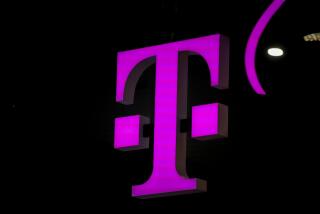THE EMERGING WIRELESS INDUSTRY : AT&T;’s Bid for McCaw Wins Key Approval : Communications: The Justice Department OKs the merger, subject to some restrictions. Further approvals are necessary.
- Share via
WASHINGTON — AT&T; Corp., which for weeks has been running TV ads depicting a futuristic era of go-anywhere communications, moved a step closer to that goal Friday as the Justice Department cleared the way for the company’s $12.6-billion acquisition of McCaw Cellular Communications Inc.
The nation’s largest long-distance telephone company and its biggest cellular telephone carrier signed a pact with the department that would permit the combination, subject to two key conditions: McCaw must provide competing long-distance carriers with equal access to its cellular network, and AT&T; must adopt safeguards that ensure its cellular equipment customers--who often compete head-to-head with McCaw--will not be disadvantaged.
The deal has already been approved by nine state utility commissions, but it faces review by the Federal Communications Commission and U.S. District Judge Harold H. Greene, who oversees a 1984 consent decree governing the breakup of the old AT&T; telephone monopoly.
“Today, we take a major step toward bringing the benefits of competition to millions of consumers of cellular telephone service, one of the fastest-growing segments of the telecommunications industry,” Anne K. Bingaman, assistant attorney general in charge of the Justice Department’s antitrust division, said in a statement.
“Equal access will help lower cellular telephone bills, just as it has helped lower long-distance rates for regular telephone service,” she said.
Clinton Administration officials have been encouraging alliances and industry consolidation, which they believe will help investment in the communications infrastructure. But they have been worried that Bingaman, who brought several high-profile class-action lawsuits against big companies as a lawyer in private practice, might be hostile to big business in her role as government antitrust cop.
“To the extent that the Justice Department found no anti-competitive behavior (and that) this deal will create benefits for consumers, we support them,” said Larry Irving, assistant secretary for communications and information at the Commerce Department.
“This deal is indicative of a larger trend whereby carriers will be offering a growing number of advanced services by forging mergers and other alliances,” said Blake Bath, an analyst at Sanford C. Bernstein in New York.
Bath added that he thinks the AT&T; deal, as well as MCI Communications’ recently approved alliance with British Telecom, will revive phone company interest in cable television acquisitions and other deals.
“I think the next decade will herald two to five major telecommunications alliances per month,” Bath said.
But for at least the next decade, AT&T; and McCaw will have to find synergy without the aid of some business arrangements normally adopted for efficiency’s sake, according to the settlement.
McCaw must maintain separate financial books, boards of officers and marketing and development functions to guard against any anti-competitive conduct. And it cannot transfer title to its cellular licenses to AT&T; or use the name AT&T; in its corporate name or in its marketing campaigns until 60% of the McCaw Cellular systems comply with the equal-access provisions of the settlement agreement.
To ensure that those provisions are met, the agreement requires that each McCaw Cellular system offer its customers equal access to any long-distance carrier within the next 21 months. And AT&T; and McCaw can’t give discounts to McCaw customers as inducement to choose AT&T; as their long-distance carrier.
The public has 60 days to comment on the settlement.
More to Read
Inside the business of entertainment
The Wide Shot brings you news, analysis and insights on everything from streaming wars to production — and what it all means for the future.
You may occasionally receive promotional content from the Los Angeles Times.








